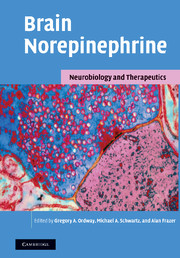Book contents
- Frontmatter
- Contents
- List of contributors
- Acknowledgements
- Introduction: revision of an old transmitter
- Part I The neurobiology of norepinephrine
- 1 Neuroanatomical and chemical organization of the locus coeruleus
- 2 Interactions of norepinephrine with other neurotransmitter systems: anatomical basis and pharmacology
- 3 Receptors for norepinephrine and signal transduction pathways
- 4 Regulation of gene transcription in the central nervous system by norepinephrine
- 5 The norepinephrine transporter and regulation of synaptic transmission
- Part II Norepinephrine and behavior
- Part III The biology of norepinephrine in CNS pathology
- Part IV Psychopharmacology of norepinephrine
- Index
4 - Regulation of gene transcription in the central nervous system by norepinephrine
from Part I - The neurobiology of norepinephrine
Published online by Cambridge University Press: 07 September 2009
- Frontmatter
- Contents
- List of contributors
- Acknowledgements
- Introduction: revision of an old transmitter
- Part I The neurobiology of norepinephrine
- 1 Neuroanatomical and chemical organization of the locus coeruleus
- 2 Interactions of norepinephrine with other neurotransmitter systems: anatomical basis and pharmacology
- 3 Receptors for norepinephrine and signal transduction pathways
- 4 Regulation of gene transcription in the central nervous system by norepinephrine
- 5 The norepinephrine transporter and regulation of synaptic transmission
- Part II Norepinephrine and behavior
- Part III The biology of norepinephrine in CNS pathology
- Part IV Psychopharmacology of norepinephrine
- Index
Summary
Introduction
During the past few years we have witnessed tremendous advances in sequencing the human genome, as well as the coding sequences of several other species. The next major hurdle is to characterize and understand the mechanisms that control the transcriptional expression and posttranslational processing of these genes. Gene expression in the brain is regulated by many neurotransmitters, hormones, and psychotropic drugs, each of which can induce discrete and unique patterns of gene expression in different brain regions and even within a single neuron. These unique patterns of expression are involved in shaping the function of the brain and its ability to adapt and generate long-term and informed responses to subsequent stimuli.
Norepinephrine (NE) is a well-known modulator of neuronal activity, and has been implicated in many aspects of brain function as well as the etiology and treatment of psychiatric illness, including depression, posttraumatic stress disorder, fear, stress, and anxiety. In addition to modulating neuronal firing and other short-term cellular processes, NE also produces long-term modulating effects via regulation of neuronal gene expression. This chapter will provide an overview of the fundamental aspects of gene transcription, including general concepts of DNA-binding elements and regulation of transcription factor function. Then we will discuss how NE, via regulation of diverse receptor-coupled signaling pathways, controls gene transcription with particular emphasis on two families of transcription factors: the cyclic adenosine monophosphate (cAMP) response element binding protein (CREB) and the c-Fos/activator protein-1 (AP-1) systems.
- Type
- Chapter
- Information
- Brain NorepinephrineNeurobiology and Therapeutics, pp. 95 - 118Publisher: Cambridge University PressPrint publication year: 2007
- 3
- Cited by



